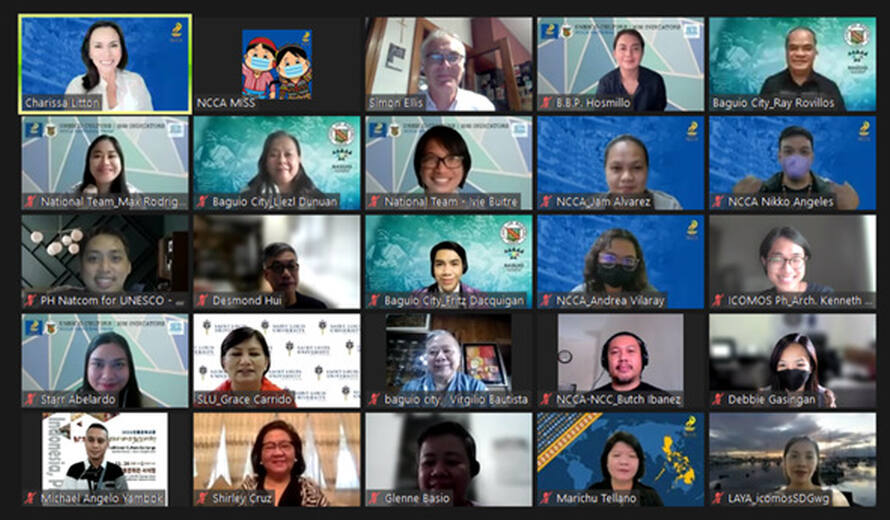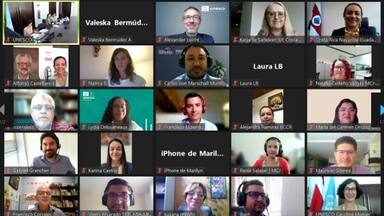Philippines and city of Baguio - Restitution workshop for the UNESCO Culture|2030 Indicators
On 22 July 2022, the final restitution workshop for the pilot implementation of the UNESCO Thematic Indicators for Culture in the 2030 Agenda (UNESCO Culture|2030 Indicators) was organized by the National Commission for Culture and the Arts (NCCA) and the Mayor Office of the City of Baguio in close collaboration with UNESCO.
The workshop was held online, gathering 80 participants, including representatives from national and local stakeholders, institutions, and authorities. The workshop was an opportunity to present the implementation results, demonstrating culture’s transversal contribution to sustainable development in the 2030 Agenda. The workshop also served to promote results dissemination, encourage policy action at national and urban level, and seek inputs from stakeholders on policy recommendations towards strengthening data collection, measurement, and monitoring for culture.
The pilot implementation of the UNESCO Culture|2030 Indicators in the Philippines and the City of Baguio was launched in October 2021 by the National Commission for Culture and the Arts (NCCA) and the Mayor Office of the City of Baguio in partnership with UNESCO and in collaboration with the UNESCO Institute for Statistics. Implementation was made possible by the generous financial contribution of the Spanish Agency for International Development Cooperation (AECID) and the National Commission for Culture and the Arts under a project titled ‘Culture|2030 Indicators: Thematic Indicators for Culture in the 2030 Agenda: Measuring Culture in the 2030 Agenda for Sustainable Development’.
The implementation succeeded in achieving the goal of collecting culture data and building the foundation for more reliable measurement systems to show the multiple ways culture contributes to the economic, social, and environmental dimensions of sustainable development. The UNESCO Culture|2030 Indicators framework is composed of 22 indicators in four thematic dimensions, measuring culture’s contribution as a sector of activity in itself and transversally as an intrinsic component present in other sectors.
This achievement was only made possible with the collaboration and engagement of a wide of range of stakeholders involved in the policy spectrum: Ministries, departments, Mayoral offices, municipalities, agencies operating in the four thematic dimensions of the framework, culture related organizations and networks, civil society and professional organizations, research institutions including academia and national institutes.
The workshop concluded the UNESCO Culture|2030 Indicators data collection and participants from the Philippines and the City of Baguio recognized the framework of the indicators as a breakthrough, underlining that it allowed them to refine the analysis of the transversal contribution of culture across policy domains and the different Sustainable Development Goals of Agenda 2030.
Mr. Ernesto Ottone R., the Assistant Director-General for Culture of UNESCO, thanked the Philippines and the City of Baguio for participating in the pilot implementation and stressed that the data collected and analyzed will inform decision-makers, concrete measures and policies, with the aim of enabling greater investment in culture and further recognition of its cross-cutting role in other sectors. He believed that the UNESCO Culture|2030 Indicators would help decision-makers build a solid, coherent, and evidence-based discourse on culture and development. He hailed that the data collected will enrich the UNESCO Culture|2030 Indicators’ Data Bank, which will facilitate future updates and analysis of local, national, regional, and global trends. He also invited participants to consider the restitution workshop as a starting point in the process of monitoring and updating data on culture.
Dr. Rene R. Escalante, Chairman of the NCCA, delivered the welcoming message for the workshop. He emphasized the strong interest of his country in facilitating the pilot implementation in the Philippines and recalled the continuous efforts undertaken throughout this project by his office in this regard.
Mr. Benjamin Magalong, Mayor of Baguio, delivered the welcoming message for the workshop on behalf of the city. He demonstrated a solid engagement of his city to remain active in the implementation of the UNESCO Culture|2030 Indicators. He announced that the project would be sustained by the Creative Baguio City Council (CBCC), which has been made aware of the strategic and long-term significance of cultural data-banking for planning, monitoring, and evaluation purposes for Baguio
Mr. B.B.P. Hosmillo, the National Expert for the Philippines, contextualized the implementation of the framework and provided an overview of the main benefits obtained and the mechanisms put in place to support the activities.
Mr. Raymundo Rovillos, the Local Expert for Baguio city, presented the urban perspective of the implementation and its significance for the city as an innovative framework to collect and analyze data on culture at the urban level, in view of elaboration of concrete policies and actions to foster sustainable development in Baguio.
Mr. Desmond Hui, UNESCO Regional Expert, provided an overview of the challenges and opportunities encountered in the implementation and presented the main findings in collaboration with the national and local experts. Mr. Simon Ellis, UNESCO International Expert, supported the presentation and elaborated on the highlights of the data collection process and their analysis. Following feedback and exchanges between stakeholders and national and local authorities, participants outlined policy recommendations stemming from the analysis of the results.
The exchanges on the results of the implementation, facilitated during the workshop by the national and local implementation teams along with the UNESCO Regional Expert, will be instrumental to the finalization of the National and Urban Reports on the pilot implementation for the Philippines and the City of Baguio.
The implementation highlighted the need for better collection of culture data including sex-disaggregated data in order to make visible the contribution of culture to Goal 5 on ‘Gender equality’, which is notably lacking on a more global level as well. The framework addresses SDG 5 transversally by allowing for the appreciation of sex-disaggregated data across a number of different data points from access to opportunities and participation in social, economic, political and cultural life. The implementation sought to include sex-disaggregated data wherever possible.
The Philippines were the first country in the Asia-Pacific region to successfully complete the pilot implementation. The workshop achieved its objective of presenting the main findings of the implementation of the UNESCO Culture|2030 Indicators, promoting results dissemination to encourage policy action at national and urban level and advocating for commitments from stakeholders to support future monitoring and data collection.
The meeting was closed by Mr. B.B.P. Hosmillo, National Expert and Raymundo Rovillos, Local Expert for the Philippines, who thanked all participants, the national and local teams and especially the stakeholders for their contribution during the project duration. Mr. Rovillos stressed that it has been evidenced that Culture contributes to sustainable development in several aspects beyond economic income. Culture has been the basis and inspiration for environmental regeneration and social resilience, and is becoming the anchor of inclusion, participation, and social cohesion across the country. He indicated that the review of the national education curricula carried out for the pilot implementation allowed to identify the efforts of the Philippines to foster awareness and respect of cultural diversity. He concluded by highlighting that the institutionalization of mechanisms for multi-stakeholder participation and decision-making, for example on heritage conservation and management, should now be sustained and pursued.
For further information on the pilot implementation in the Philippines and in the city of Baguio, please consult the following webpage: https://whc.unesco.org/en/activities/1195/.
To learn more about the UNESCO Culture|2030 Indicators framework, please consult the following webpage: UNESCO Culture|2030 Indicators
Philippines and city of Baguio



